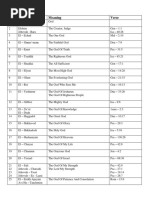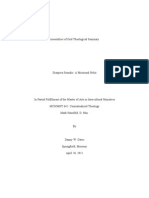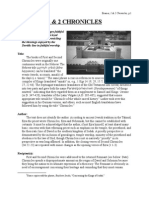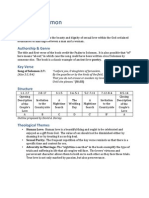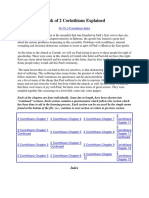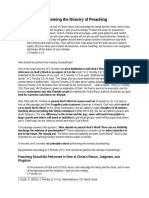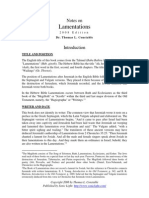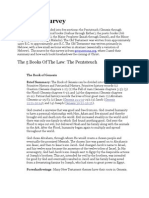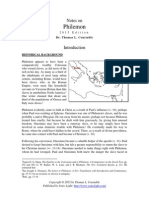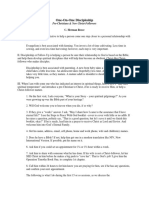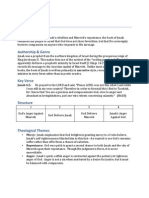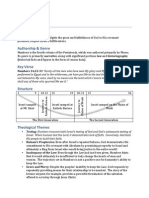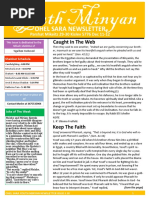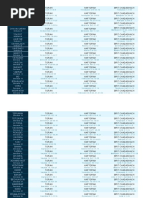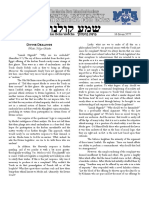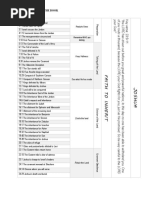10 1-2 Kings
10 1-2 Kings
Uploaded by
jgferchCopyright:
Available Formats
10 1-2 Kings
10 1-2 Kings
Uploaded by
jgferchOriginal Description:
Copyright
Available Formats
Share this document
Did you find this document useful?
Is this content inappropriate?
Copyright:
Available Formats
10 1-2 Kings
10 1-2 Kings
Uploaded by
jgferchCopyright:
Available Formats
1
&
2
Kings
Purpose
1
and
2
Kings
demonstrate
the
failure
of
Davids
successors
to
live
up
to
the
ideals
of
the
Davidic
Covenant
and
uphold
the
law
of
God,
resulting
in
destruction
and
exile.
Authorship & Genre
1 and 2 Kings together form a single book that was completed after the fall of Judah in 586 BC. The author pulled together narrative accounts and historiographical court records from throughout the history of the monarchy. Several of these sources are mentioned by name, such as The Book of the Acts of Solomon (1 Kings 11:41, see also 14:19 & 15:23).
Key Verse
1 Kings 9:6-7: But if you or your sons indeed turn away from following Me, and do not keep My commandments and My statutes which I have set before you, and go and serve other gods and worship them, then I will cut off Israel from the land which I have given them, and the house which I have consecrated for My name, I will cast out of My sight. So Israel will become a proverb and a byword among all peoples. (NASB)
Structure
1
11
12
16
1K17
2K8
8
17
18
25
Israels
Golden
Age
The
Kingdom
Divides
Rehoboam
to
Asa
Jeroboam
to
Ahab
Elijah
and
Elisha
Decline
and
Fall
Decline
and
Fall
Call
for
of
Israel
of
Judah
Repentance
Jehoshophat
Ahab
to
Jehoram
Jehoram
to
Ahaz
Jehu
to
Hoshea
Hezekiah
to
Zedekiah
Solomon
1 Kings
2 Kings
Theological
Themes
Temple:
The
Temple
is
built
in
the
beginning
of
1
Kings
and
destroyed
at
the
end
of
2
Kings.
This
turn
in
events
highlights
the
peoples
rejection
of
their
relationship
with
God
and
their
removal
from
His
presence
as
promised
in
Deuteronomy.
Prophetic
Word:
When
the
kings
failed,
the
prophets
called
them
to
repent.
The
prophets
messages
did
not
usually
predict
the
future,
but
rather
summoned
the
people
to
return
to
the
Lord.
Idolatry:
Jeroboam
introduced
idolatry
to
Israel
on
a
wide
scale.
Future
kings
response
to
this
demonstrated
their
effectiveness.
A
bad
king
did
evil
in
the
sight
of
the
LORD;
he
not
depart
from
the
sins
of
Jeroboam
(2
Kings
15:28).
David:
David
provided
the
model
for
an
ideal
king.
A
good
king
did
right
in
the
sight
of
the
LORD,
according
to
all
that
his
father
David
had
done
(2
Kings
18:3).
You might also like
- God Names in BibleDocument3 pagesGod Names in Bibleyeshuamuthu100% (11)
- Christian Baby NamesDocument7 pagesChristian Baby NamesAllwyn0% (2)
- Textual Bible Tov PDFDocument538 pagesTextual Bible Tov PDFZachary Kleiman100% (2)
- Book of ChroniclesDocument8 pagesBook of ChroniclesFebin Mathew philip100% (1)
- Diaspora Somalis: A Missional HelixDocument27 pagesDiaspora Somalis: A Missional HelixDanny Davis100% (1)
- TeraphimDocument3 pagesTeraphimAlexis ValarNo ratings yet
- Power in The Name Derek PrinceDocument183 pagesPower in The Name Derek Princesunlight_thy3154100% (17)
- Hallelujah PDFDocument6 pagesHallelujah PDFEmiliano Kabá100% (1)
- A Study of Israel's Hymn BookDocument41 pagesA Study of Israel's Hymn BookJosé Givaldo O. de Lima100% (1)
- 1 2 Chronicles NotesDocument16 pages1 2 Chronicles NotesJohn Stanley100% (1)
- The Book of Chronicles (1 & 2 Chronicles) : AuthorshipDocument26 pagesThe Book of Chronicles (1 & 2 Chronicles) : AuthorshipEriellynn LizaNo ratings yet
- Wisdom LiteratureDocument4 pagesWisdom Literatureapi-20985820100% (1)
- 11 1-2 ChroniclesDocument1 page11 1-2 ChroniclesjgferchNo ratings yet
- Spiritual GiftsDocument13 pagesSpiritual GiftsJohnNo ratings yet
- Worship Him For Who and What He Has DoneDocument11 pagesWorship Him For Who and What He Has DoneEunji N JeffNo ratings yet
- TMS Biblical BeliefsDocument6 pagesTMS Biblical BeliefsJohn C. Lewis100% (1)
- Wisdom Literature IsDocument25 pagesWisdom Literature IsgladNo ratings yet
- 01 GenesisDocument1 page01 GenesisjgferchNo ratings yet
- The Day of AtonementDocument52 pagesThe Day of AtonementBill CreasyNo ratings yet
- 18 Song of SolomonDocument1 page18 Song of SolomonjgferchNo ratings yet
- 1&2 SamuelDocument31 pages1&2 SamuelLusila Retno Utami50% (2)
- Exodus-F B HoleDocument78 pagesExodus-F B Holecarlos sumarchNo ratings yet
- T Austin-Sparks - But Ye Are Come Unto Mount ZionDocument105 pagesT Austin-Sparks - But Ye Are Come Unto Mount ZionChristopher Okokon AmbaNo ratings yet
- LESLIE C. ALLEN. WBC Psalms-101-150Document3 pagesLESLIE C. ALLEN. WBC Psalms-101-150jcbneves7558No ratings yet
- 20 JeremiahDocument1 page20 JeremiahjgferchNo ratings yet
- Esther 1,2 PDFDocument8 pagesEsther 1,2 PDFjeanette_aufier1293No ratings yet
- The Mirrorlike Organization of The Book of RevelationDocument2 pagesThe Mirrorlike Organization of The Book of RevelationAmazing VideosNo ratings yet
- "Book of Titus" SummaryDocument2 pages"Book of Titus" SummaryRobertNo ratings yet
- Prophetical Movt& Books NotesDocument43 pagesProphetical Movt& Books NotesKishore EwcNo ratings yet
- An Exegetical Study On 1st Corinthians 6Document15 pagesAn Exegetical Study On 1st Corinthians 6dario langit100% (1)
- Why Certain Animals Are Forbidden in LeviticusDocument21 pagesWhy Certain Animals Are Forbidden in Leviticusgnomgnot7671No ratings yet
- Infancy Narratives ChartDocument2 pagesInfancy Narratives Chartapi-356016506No ratings yet
- Book of 2 Corinthians ExplainedDocument3 pagesBook of 2 Corinthians ExplainedxxxxNo ratings yet
- 1corinthians - Thomas Constable PDFDocument206 pages1corinthians - Thomas Constable PDFMonica Catalina Alvear SepulvedaNo ratings yet
- "The Context of The Prophets": An IntroductionDocument16 pages"The Context of The Prophets": An IntroductionPortia SumabatNo ratings yet
- Exegesis:: Luke 19-21. in The TempleDocument14 pagesExegesis:: Luke 19-21. in The TempleVincent De VeraNo ratings yet
- Textual Commentary - John PDFDocument577 pagesTextual Commentary - John PDFandresilva32100% (1)
- (2 Tim 4:1-5) Performing The Ministry of PreachingDocument9 pages(2 Tim 4:1-5) Performing The Ministry of PreachingGregory Brown100% (1)
- 02 Wisdom-Literature Teachers NotesDocument19 pages02 Wisdom-Literature Teachers NotesGyebi EmmaNo ratings yet
- 10-14-2007 Created For His GloryDocument31 pages10-14-2007 Created For His Glorykingswaycommunity100% (1)
- Isaiah Class NotesDocument9 pagesIsaiah Class NotesEmanuel ValdezNo ratings yet
- Introduction To 2 ThessaloniansDocument4 pagesIntroduction To 2 ThessaloniansPeterNo ratings yet
- Song of Songs - ReflectionsDocument2 pagesSong of Songs - ReflectionsDave100% (1)
- Ezra & Nehemiah Lesson 1 Making Sense of History: Zerubbabel and EzraDocument2 pagesEzra & Nehemiah Lesson 1 Making Sense of History: Zerubbabel and EzraMoses DianNo ratings yet
- 07 Cain and AbelDocument4 pages07 Cain and AbelNew Life Mission CanadaNo ratings yet
- LamentationsDocument28 pagesLamentationsxal22950No ratings yet
- Theodicy and The Book of JobDocument9 pagesTheodicy and The Book of JobKathy HaanNo ratings yet
- The Bible The Inspired Revelation of GodDocument10 pagesThe Bible The Inspired Revelation of Godmarcus_bonifaceNo ratings yet
- "Come With Me, and See My Zeal For The LORD." II Kings 10:16Document2 pages"Come With Me, and See My Zeal For The LORD." II Kings 10:16Mar Lon IbanezNo ratings yet
- Shaking The Dust OffDocument25 pagesShaking The Dust Off31songofjoyNo ratings yet
- Unanswered PrayerDocument15 pagesUnanswered PrayerAnthony D'AngeloNo ratings yet
- OT Bible SurveyDocument35 pagesOT Bible Surveyapi-25885259No ratings yet
- Summary of The Book of LeviticusDocument5 pagesSummary of The Book of LeviticusScribdTranslations100% (1)
- Minor Prophets, Study ofDocument52 pagesMinor Prophets, Study ofMichael Gonzales GefesNo ratings yet
- 17 EcclesiastesDocument1 page17 EcclesiastesjgferchNo ratings yet
- The Burning Bush - Exodus 2:11-25 3:1-10Document10 pagesThe Burning Bush - Exodus 2:11-25 3:1-10Timothy LamNo ratings yet
- Afaan Oromo-Chapter 05 - Wikibooks, Open Books For An Open WorldDocument10 pagesAfaan Oromo-Chapter 05 - Wikibooks, Open Books For An Open Worldbisert woldNo ratings yet
- Twenty-Five Short Answers To Big Questions About CreationDocument57 pagesTwenty-Five Short Answers To Big Questions About CreationJeffrey HidalgoNo ratings yet
- Thomas Constable Philemon PDFDocument20 pagesThomas Constable Philemon PDFLuciano Silva0% (1)
- Nehemiah 10 As An Example of Early Jewish Biblical ExegesisDocument8 pagesNehemiah 10 As An Example of Early Jewish Biblical Exegesiseb1234No ratings yet
- The Book of Job - A Study Guide With Introductory Comments Summaries and Review QuestionsDocument45 pagesThe Book of Job - A Study Guide With Introductory Comments Summaries and Review QuestionsddubyaNo ratings yet
- One-On-One Discipleship: Pre-Christians & New Christ-FollowersDocument18 pagesOne-On-One Discipleship: Pre-Christians & New Christ-FollowersAYSON N. DELA CRUZNo ratings yet
- 1 - Introduction To WorshipDocument15 pages1 - Introduction To Worshipjgferch100% (1)
- 4 - The Wisdom PsalmDocument19 pages4 - The Wisdom PsalmjgferchNo ratings yet
- Purpose: Amos 2:6: Thus Says The LORDDocument1 pagePurpose: Amos 2:6: Thus Says The LORDjgferchNo ratings yet
- 6 - The Royal PsalmDocument16 pages6 - The Royal PsalmjgferchNo ratings yet
- 8 - The Enthronement PsalmDocument10 pages8 - The Enthronement PsalmjgferchNo ratings yet
- Malachi: Purpose Authorship & GenreDocument1 pageMalachi: Purpose Authorship & GenrejgferchNo ratings yet
- 28 JonahDocument1 page28 JonahjgferchNo ratings yet
- 3 - The Lament PsalmDocument15 pages3 - The Lament Psalmjgferch100% (1)
- 18 Song of SolomonDocument1 page18 Song of SolomonjgferchNo ratings yet
- 02 Introduction To The PentateuchDocument8 pages02 Introduction To The Pentateuchjgferch100% (1)
- 20 JeremiahDocument1 page20 JeremiahjgferchNo ratings yet
- 30 NahumDocument1 page30 NahumjgferchNo ratings yet
- 22 EzekielDocument1 page22 EzekieljgferchNo ratings yet
- 31 HabakkukDocument1 page31 HabakkukjgferchNo ratings yet
- 23 DanielDocument1 page23 DanieljgferchNo ratings yet
- 24 HoseaDocument1 page24 HoseajgferchNo ratings yet
- 17 EcclesiastesDocument1 page17 EcclesiastesjgferchNo ratings yet
- 04 NumbersDocument1 page04 NumbersjgferchNo ratings yet
- 13 EstherDocument1 page13 EstherjgferchNo ratings yet
- 19 IsaiahDocument1 page19 Isaiahjgferch100% (1)
- 15 PsalmsDocument1 page15 PsalmsjgferchNo ratings yet
- 03 LeviticusDocument1 page03 Leviticusjgferch100% (1)
- 12 Ezra NehemiahDocument1 page12 Ezra NehemiahjgferchNo ratings yet
- 11 1-2 ChroniclesDocument1 page11 1-2 ChroniclesjgferchNo ratings yet
- 02 ExodusDocument1 page02 Exodusjgferch100% (1)
- Kolel Chabura: Pro-Kollel HalfDocument7 pagesKolel Chabura: Pro-Kollel HalfAqibha Y WeisingerNo ratings yet
- Dead Sea Scrolls SourcesDocument76 pagesDead Sea Scrolls SourcesPablo Rodrigues100% (1)
- Christine Hayes, Rabbinic Contestations of AuthorityDocument19 pagesChristine Hayes, Rabbinic Contestations of AuthorityAriel JusidNo ratings yet
- Rabbi Jonathan Sacks On Parshat ShemosDocument4 pagesRabbi Jonathan Sacks On Parshat ShemosgnswebNo ratings yet
- Sacred Treasure The Cairo GenizDocument2 pagesSacred Treasure The Cairo GenizJonatas cassianoNo ratings yet
- Adon OlamDocument7 pagesAdon OlamsandyNo ratings yet
- 1 & 2 KingsDocument29 pages1 & 2 KingsAnonymous sSFrqPbfL9100% (1)
- Nitzavim Lekutei Sichos AbstractDocument2 pagesNitzavim Lekutei Sichos AbstractRabbi Benyomin HoffmanNo ratings yet
- Issue 20 MikeitzDocument4 pagesIssue 20 Mikeitzapi-294258668No ratings yet
- Megillah 9Document67 pagesMegillah 9Julian Ungar-SargonNo ratings yet
- Gluten in The Context of Kiddush: Parashiyot Tazri'a-Metzora 3 Iyar 5777 April 29, 2017 Vol. 22 No. 26Document4 pagesGluten in The Context of Kiddush: Parashiyot Tazri'a-Metzora 3 Iyar 5777 April 29, 2017 Vol. 22 No. 26outdash2No ratings yet
- Bereshit Noach Lech Lecha Vayera Chayai Sarah Toldot Vayetze Vayishlach Vayeshev Mikeitz Vayigash Vayechi Shemot Vaerah BO B'Shalach Yitro MishpatimDocument4 pagesBereshit Noach Lech Lecha Vayera Chayai Sarah Toldot Vayetze Vayishlach Vayeshev Mikeitz Vayigash Vayechi Shemot Vaerah BO B'Shalach Yitro MishpatimSLioNo ratings yet
- Parashas Beha'aloscha: 16 Sivan 5777Document4 pagesParashas Beha'aloscha: 16 Sivan 5777outdash2No ratings yet
- October 8 Shabbat Announcements (Yom Kippur)Document4 pagesOctober 8 Shabbat Announcements (Yom Kippur)gnswebNo ratings yet
- Maxsiddurfinal 1Document42 pagesMaxsiddurfinal 1JimsTalumewo100% (1)
- 03 Nefesh Hachaim WebsiteDocument142 pages03 Nefesh Hachaim WebsiteHelio LaureanoNo ratings yet
- Apocrypha and PseudepigraphaDocument4 pagesApocrypha and PseudepigraphaZoSo Zeppelin100% (1)
- Talmud QuotesDocument22 pagesTalmud QuotesRobin TobarNo ratings yet
- Kasher Rimmon, Angelology and The Supernal Worlds in The Aramaic Targums To The ProphetsDocument24 pagesKasher Rimmon, Angelology and The Supernal Worlds in The Aramaic Targums To The ProphetsPosa Nicolae TomaNo ratings yet
- Young Israel Orange County - Rav FischerDocument4 pagesYoung Israel Orange County - Rav FischerAdamhmanNo ratings yet
- Divine Names and TitlesDocument7 pagesDivine Names and Titlesjld4444No ratings yet
- Moses and The Exodus: Document #: TX004706Document10 pagesMoses and The Exodus: Document #: TX004706saintmaryspressNo ratings yet
- Horizontal Chart JoshuaDocument1 pageHorizontal Chart JoshuaKarina LoayzaNo ratings yet
- MOSESDocument2 pagesMOSESMark Goforth100% (2)
